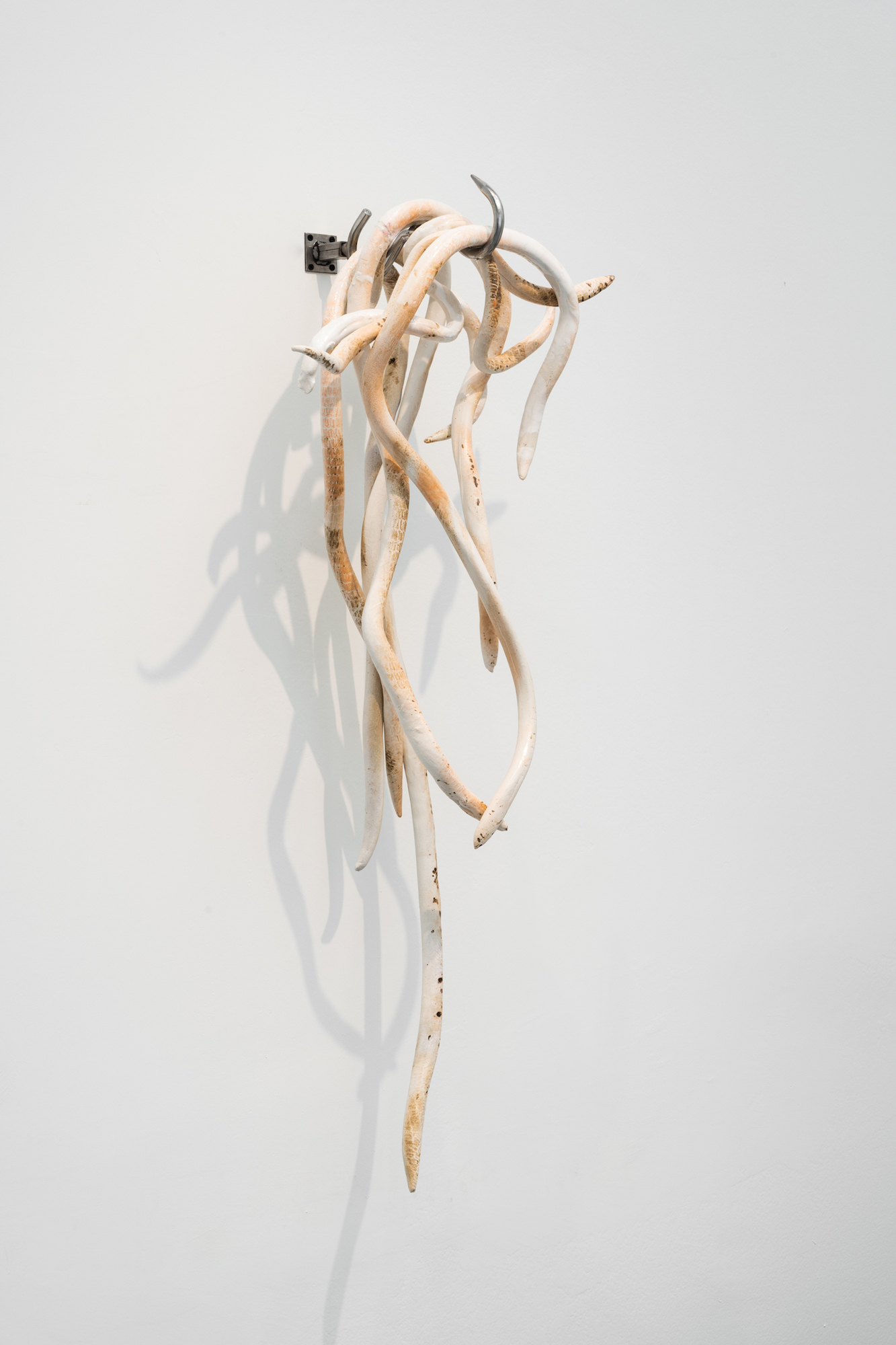
Parasite (n.)
Ambra Castagnetti, APHROS, installation view, 2021 [photo: Sabastiano Luciano; courtesy of the artist and Galerie Rolando Anselmi, Rome]
Share:
Everyone has parasites. If you’ve ever eaten food, drunk water, had sex, or spent time in a forest, someone else has, at some point, made your body its home.
Ticks, fleas, leeches, mosquitoes. Lampreys and roundworms. Things that suck and harvest. Parasites are known for their dependence, for thriving at others’ expense. The parasitic implies a unidirectional relationship, an unfair or imbalanced one. For this reason, parasites make an easy metaphor for freeloaders—the pernicious, the un-self-sufficient, or the lazy. Use of the word casts the dependent as disgusting.
In Bong Joon-Ho’s lauded 2019 movie, Parasite, the underclass of Korean society is depicted as a barnacle on the edifice of wealth. A poor family employed by a wealthy one takes up secret residence within the mansion, and the interlopers sneak out at night to glean and steal what they need to survive.
Bong applies the parasite metaphor with criticality and irony; economic dependence and its attendant power relations, he suggests, are structural rather than personal. Drastic class divisions inevitably turn all potential guest-host relations into parasite-host relations, denying the capacity for co-existence or reciprocity. The needy are cast as invaders, threats.
Such a relationship structure, the movie ultimately suggests, can end only in violence: in a total takeover by the “undesirable” element—or in an expulsion or an exorcism of it. But many, or most, parasites in the natural world live in ongoing symbiosis with their hosts. In many cases there can be no host bodies without the parasites with which they evolved. In simple terms: If a dog has had heartworm from birth to death, the heartworm is an integral part of the dog.
Myriad examples exist of neutral or even healthful relationships between parasites and the bodies they share. Equilibrium is often reached—not a tentative balance, but a stable one. And most parasitic relationships are relatively banal. You won’t notice most of the parasites in your body, for instance, unless one species proliferates beyond what your body can handle, or unless you acquire a particularly harmful one.
Parasites are wildly creative and inventive creatures. Take the notorious Cymothoa exigua, a crustacean that sneaks into a fish’s mouth, severs the fish’s tongue, and installs itself as an ersatz tongue in perpetuity. There, it survives by sucking off the fish’s blood and mucus—but in most cases the fish continues to be able to eat food, too. The parasite-as-tongue works just fine. The fish’s tongue may not be its own, but whose tongue is entirely their own? So what if a parasite depends on another body for nourishment? Doesn’t everybody?
Sometimes parasites have unintended positive effects on their hosts. People in many parts of the world co-evolved with hookworms, and scientists have theorized that the worms’ absence in oversanitized societies has left people without crucial immunological defenses. Some parasite evangelists preach the benefits of walking barefoot around pit latrines in developing nations to acquire the “missing” companions. If you’re too clean, the thinking goes, your body will attack itself instead of the parasites it evolved to keep at bay.
Several years ago I told a friend about my trouble sleeping at normal hours, and he, an expert in arcane health issues, pointed to my stomach. Some parasites have different circadian rhythms than people and become particularly active at night, he explained. If enough of them live in your gut, he said, they might be excreting certain chemicals, moving all around at night, and keeping you awake.
Ambra Castagnetti, Dependency, installation view, 2022, Mixed media (fabric, chains, ropes, ceramics, clothing) [photo: Ela Bialkowska; courtesy of the artist and Biennale College Arte, La Biennale di Venezia,]
If I hadn’t already been struggling to sleep, the image of tiny creatures—worms, most likely—dancing in my intestines was enough to keep me up at night. I became obsessed with finding remedies, cleanses, ways to rid myself of the active creatures. But I discovered that the risks of a cleanse are as great as the potential rewards. You wind up evacuating the harmless and beneficial creatures, too.
I found I couldn’t imagine myself without my parasites: We’d come this far together. I lay awake and spoke to them. I imagined I could communicate with them, calm us down together, and induce us all to rest.
Elvia Wilk is a writer living in New York. She is the author of the novel Oval and the essay collection Death by Landscape. She contributes to publications like The New York Review of Books, The Nation, The Atlantic, Granta, n+1, Bookforum, Artforum, Frieze, and 4Columns, and is a contributing editor at e-flux journal.
